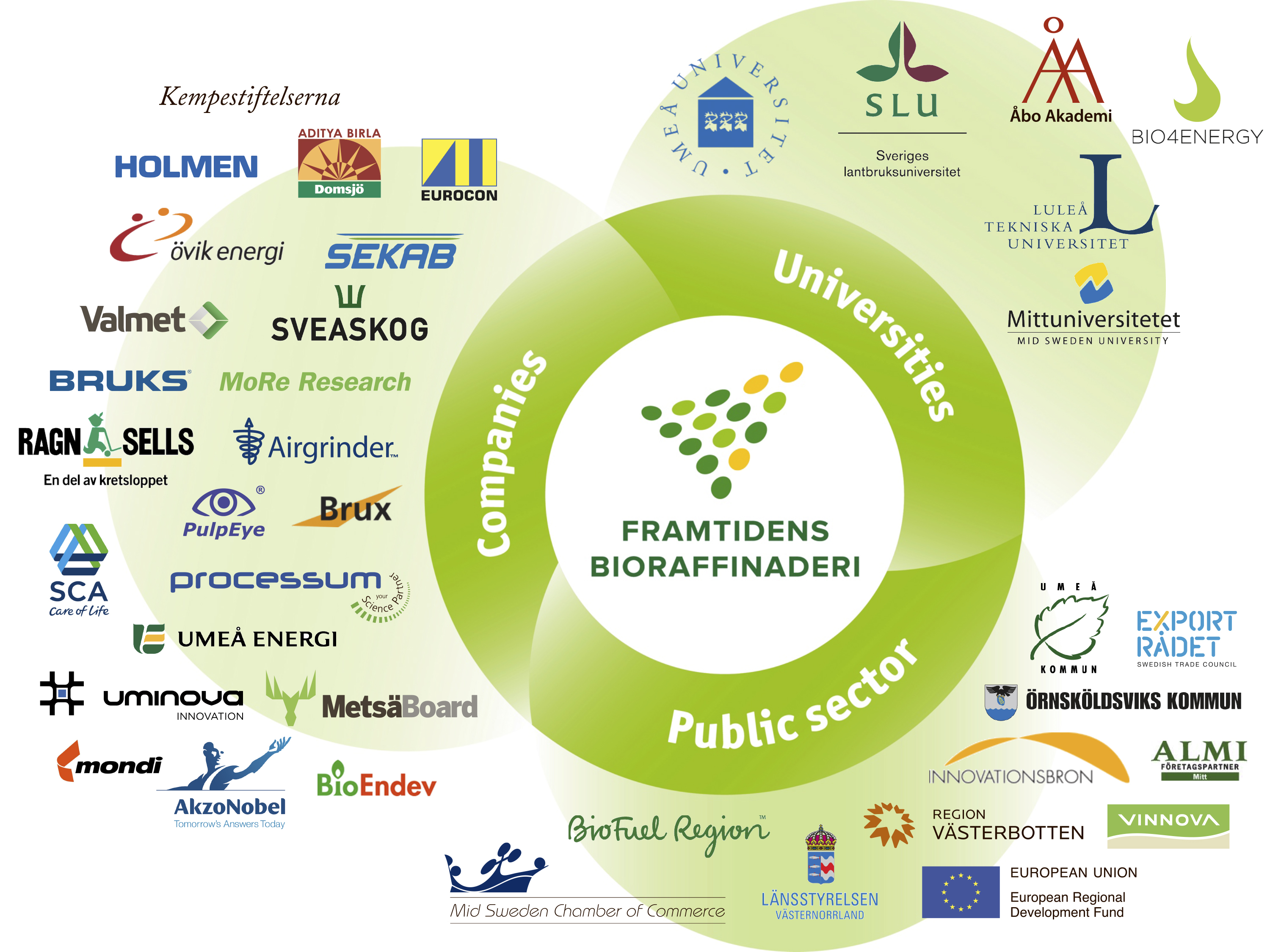Örnsköldsvik municipality is located in the Västernorrland region of Sweden, some 550 km north of Stockholm. The approximately 55,000 inhabitants in Örnsköldsvik are fairly evenly distributed in countryside communities, rather than being concentrated in the central town. Trade and heavy industry have dominated the regional economy; however, the municipality’s vast forests have allowed for major industrial ventures based on bioeconomy.
Bioeconomy in the region
Bioeconomy in the Örnsköldsvik region has a long tradition, originating from pulp mill activities in the early 20th century (e.g. pulp mill in Domsjö established by Mo and Domsjö AB). Initially the production consisted mainly of paper and pulp, and to a lesser degree, energy. In the 1930s, production expanded to include chemicals chlorine and ethanol, with the establishment of an early version of a biorefinery. MoDo was one of the first companies to combine pulp production with ethanol and other chemicals. During the 1990s, the Örnsköldsvik region suffered a serious decline when several businesses closed, downsized, or relocated. Despite this, local actors engaged in building up a cluster and a technology park based on a novel biorefinery initiative. In 2003, Processum started to gather local and regional forces into a joint clustering initiative. In 2005, Processum received funding for the development of the “Biorefinery of the Future” under the first round of VINNVÄXT, a government program that seeks to promote regional growth through dynamic innovation systems.
Policy support for the bioeconomy
The Örnsköldsvik region has shown a strong private–public long-term commitment to sustainable regional growth. Municipalities, firms, and universities have teamed up to brand the region and are focusing on the social, technical, and economic aspects of the regional bioeconomy. For many years, Örnsköldsvik has promoted sustainable development with energy as a focal point. It has done so by adopting the first ethanol buses and cars, and providing municipal heating in the suburbs. Furthermore, the municipality itself supports the bioeconomy cluster with an annual grant of SEK 500,000 and it has a member on the board of directors for the cluster. The municipality is also an actor in the cluster through some of its municipal firms (an energy firm and an ethanol producer). Moreover, bioeconomy initiatives and R&D in the region have been made possible with support from the VINNVÄXT program, which promotes sustainable growth in the regions. In turn, the success of the bioeconomy in Örnsköldsvik’s regional development has inspired policy making in Sweden and influenced similar initiatives in other regions.
Spotlight on: Biorefinery of the Future
The “Biorefinery of the Future” project, led by the Processum cluster company and co-financed by VINNVÄXT, is the flagship project of the Örnsköldsvik bioeconomy. The Örnsköldsvik Biorefinery of the Future cluster has 20 member companies. Most of the cluster companies are in some way connected to the forest industry, the chemical industry, or the energy industry (see figure: Biorefinery of the future project partners). Some of the most representative industries are: M-Real’s (formerly MoDo), pulp mill in Husum, Domsjö Fabriker’s cellulose mill in Örnsköldsvik, and Svensk Etanolkemi’s ethanol production based on cellulose. The purpose of the Biorefinery of the Future is to accelerate development in the field of biorefining woody biomass. By improving the existing pulp and paper mills, the intention is to maximize production and to create products of greater value. Thus, the cluster member companies, academic partners, and the local community come together to create, promote, and invent products (e.g. chemicals and new materials) and processes based on lignocellulosic feedstock in a triple-helix setup. To do this, 80% of the project funding is devoted to R&D and 20% to building the innovation system. In this way, substantial resources are being devoted to scaling up promising projects.
Biorefinery of the Future project partners

Regional dimension
The good accessibility to natural resources and the concentration of human and physical capital in the Örnsköldsvik region represent the basic elements needed for the development of the bioeconomy. However, the alignment of knowledge and resources has been made possible by the close cooperation that exists among the regional actors in Örnsköldsvik. The joint forces among the public and private sectors and academia led by Processum have allowed for a coherent approach to regional development, with their focus on biorefinery initiatives. Moreover, the 10-year funding from the VINNVÄXT programme has been strategically important in attracting new private actors to get involved and invest in the region. The investments made within the bioeconomy sector have directly and indirectly generated new jobs and increased trade with other regions. This in turn may potentially trigger a greater regional impact as it spills over into other sectors and economic activities.
Learn more…